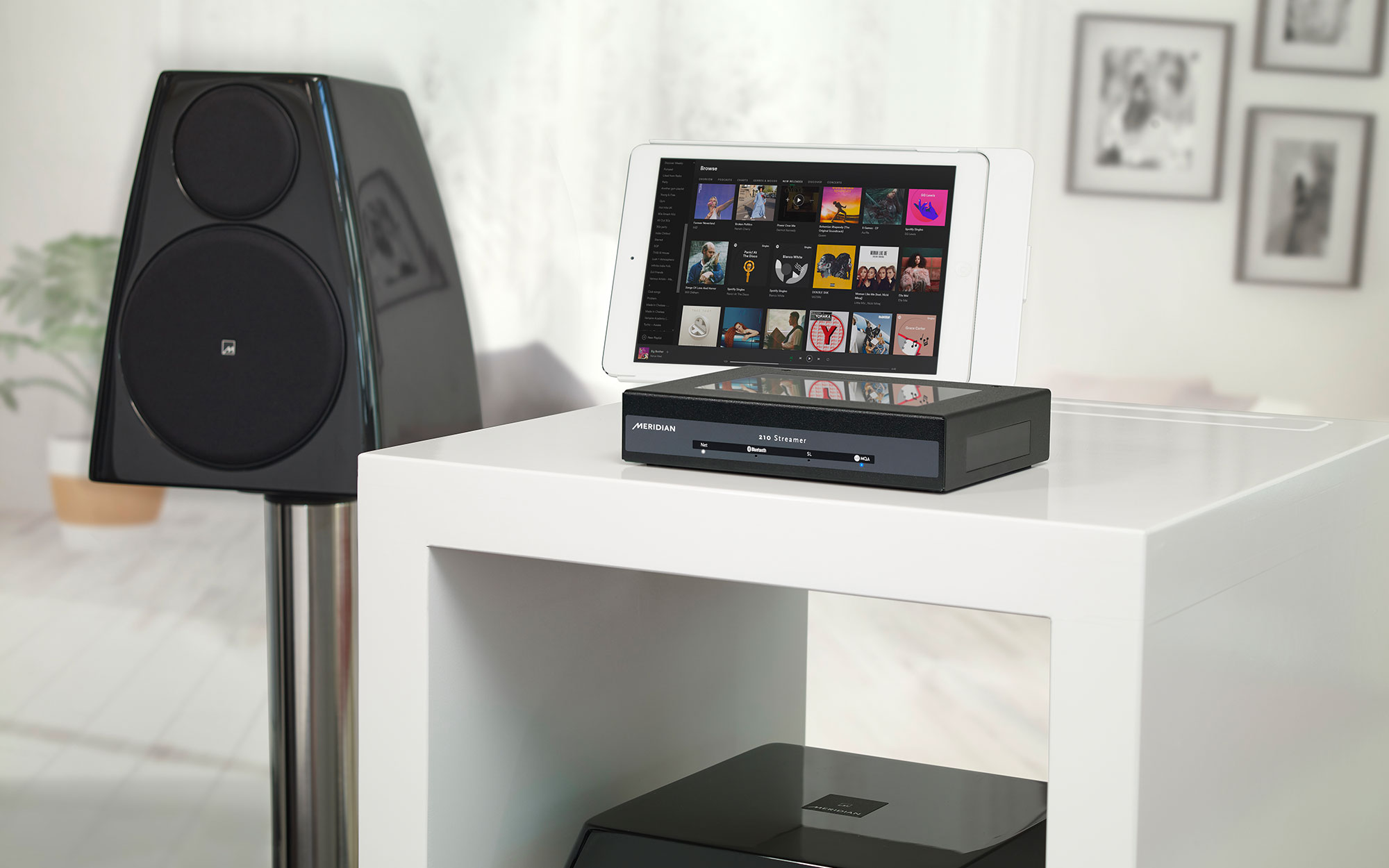
Streaming
Meridian customers - create an account so you can register your product(s) for your extended warranty.
Dealers, integrators, and installers - create an account to request access to Dealer Resources and/or apply to become a Meridian dealer.

Streaming
The Meridian 210 Streamer is a high performance audio source which allows streaming services used on smartphones, tablets and other devices to be played on your audio system.
Featuring both wired and dual-band Wi-Fi network connections, alongside Bluetooth® wireless technology, it offers great flexibility for installation and product location.
With the 210 Streamer, music can be accessed through Spotify Connect, Bluetooth® wireless technology and UPnP. It is also a Roon Ready device. The USB input allows it to become a UPnP server.
Find a distributorStreaming
210
The Meridian 210 Streamer enables music accessed from high-quality streaming platforms to be integrated seamlessly with Meridian systems. The 210 can be attached directly to a pair of DSP loudspeakers or it can be connected to any system with a SpeakerLink input. In all cases, volume and playback controls are synchronised between streaming apps and the Meridian system.
Digital Precision
Meridian Digital Precision maximises the signal-to-noise ratio of the digital audio, ensuring the finest details of every song are retained.
True Link
Meridian True Link is an encryption method for transferring high-definition digital audio over SPDIF connections. It allows secure movement of digital audio whilst ensuring that the SPDIF clock signal can be transmitted with minimum degradation.
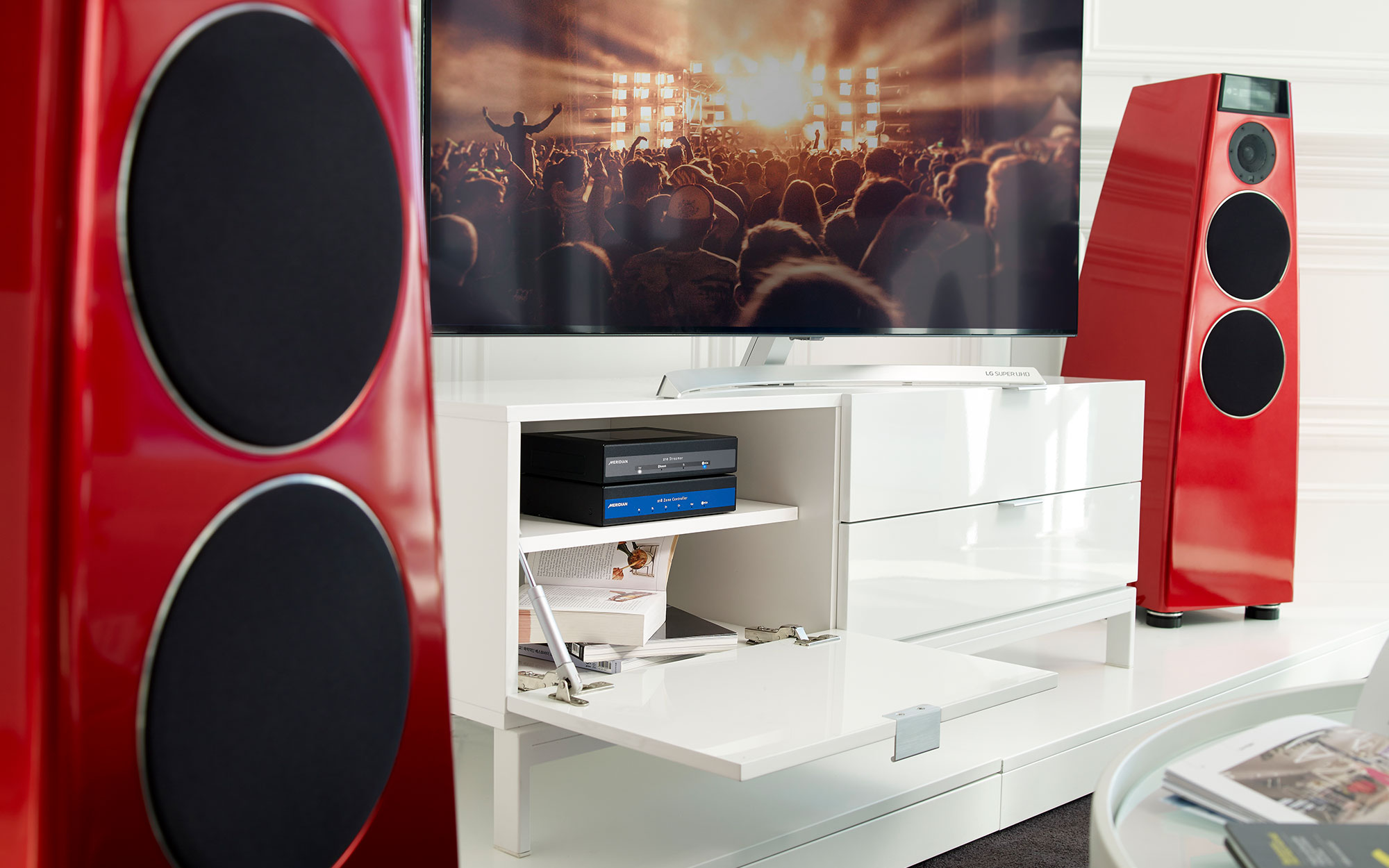
Bluetooth® wireless technology
Allows audio to be played directly from a phone, tablet or computer - whether or not the 210 is connected to a network.
Wired or Wi-Fi?
Either. The 210 can be connected to your network either via an Ethernet connection or by using its built-in Wi-Fi capability.
Play from USB storage
Play music stored on a UPnP music server elsewhere on the network or from USB storage plugged directly into the 210.
MQA Core Decoder
MQA files are unfolded once so the MQA Core stream can be passed onto an MQA renderer product.
Roon Ready
Uses Roon streaming technology, for an incredible user interface, simple setup, rock-solid daily reliability, and the highest levels of audio performance, without compromise.
The Meridian 200 Series is a collection of high-performance audio zone controllers, theatre controllers and amplifiers, all designed with the Customer Integrator in mind.
Each product is designed to work in isolation or as part of a larger multi-zone audio-visual installation and a compact footprint means they fit perfectly within the rack. With a wide range of audio inputs and outputs, flexible installation options and many of Meridian’s proprietary technologies on board, 200 Series products deliver outstanding performance in many applications.
Here you will find a quick overview of the product highlights and features.
Here you will find a summary of the complete range of Meridian products in one document.
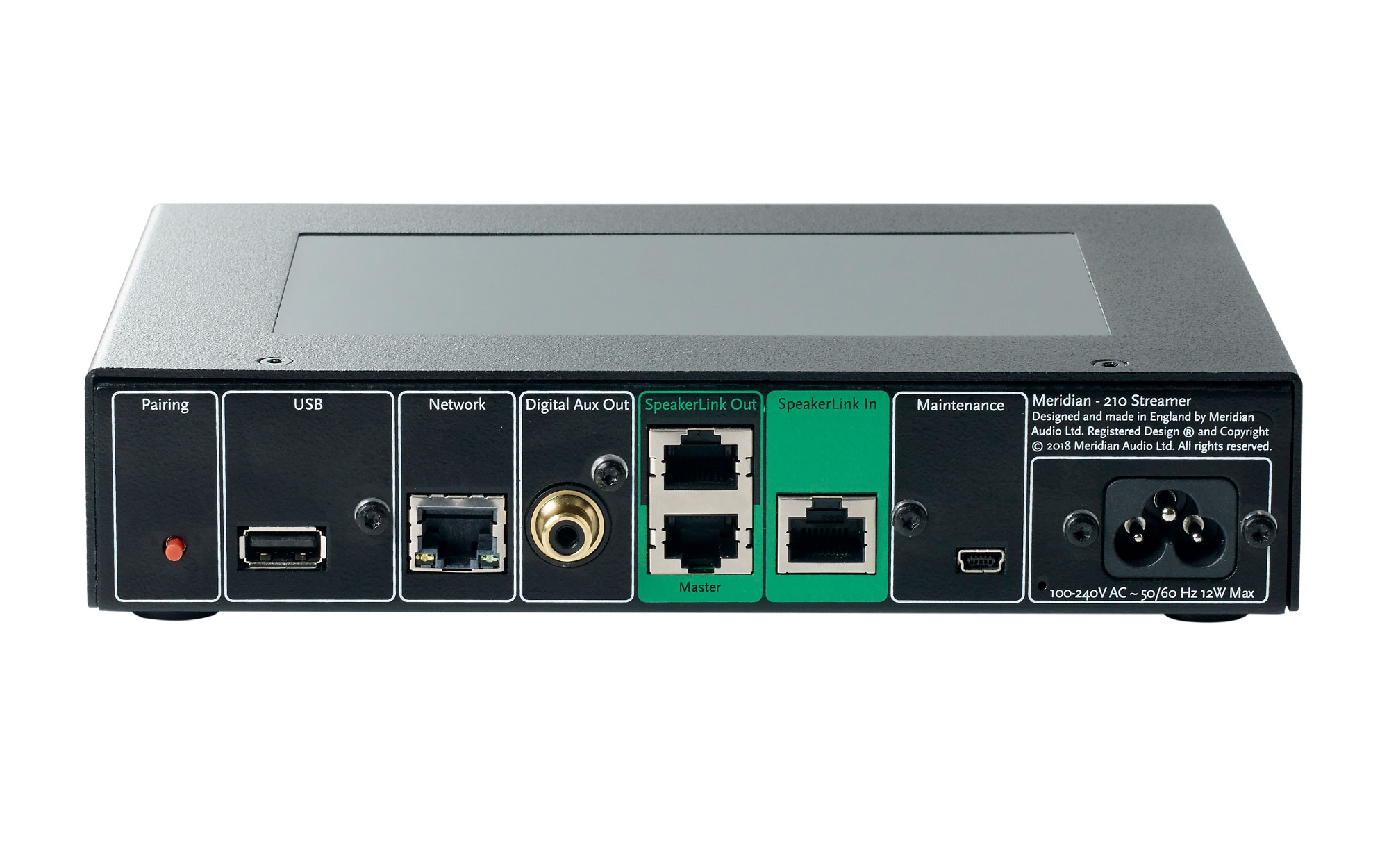
CONNECTIONS
Power input (IEC "cloverleaf" connector)
USB input (USB-A connector)
1 x SpeakerLink input (RJ45)
2 x SpeakerLink output (RJ45)
1 x co-ax digital aux output (RCA phono)
Network socket for Ethernet connection (RJ45)
Maintenance socket (mini-USB connector)
DISPLAY/CONTROL
Front-panel indicator LEDs for Standby, Network, Spotify Connect, Bluetooth status, SpeakerLink, and MQA
Rear-panel indicator for power
Rear-panel pairing button
DIMENSIONS/WEIGHT
HEIGHT: 42mm [1.65in]
WIDTH: 204mm [8.0in]
DEPTH: 150mm [5.9in] plus connectors
WEIGHT: 0.66Kg [1.46lbs]
POWER
High performance power supply: 100v ac 50/60 Hz |110-120V ac 50/60Hz | 220-240V ac 50/60Hz
Maximum power consumption: 12W
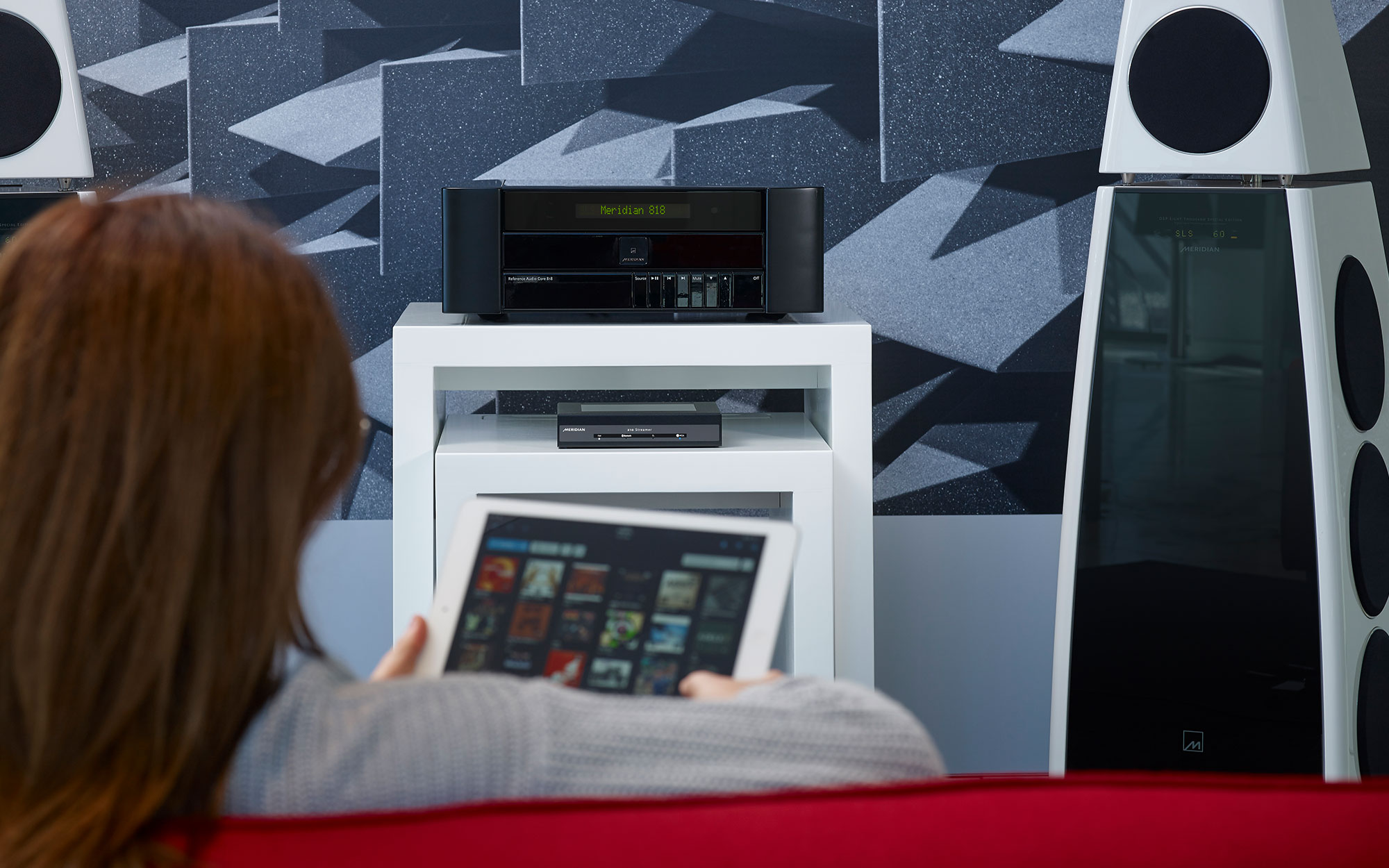

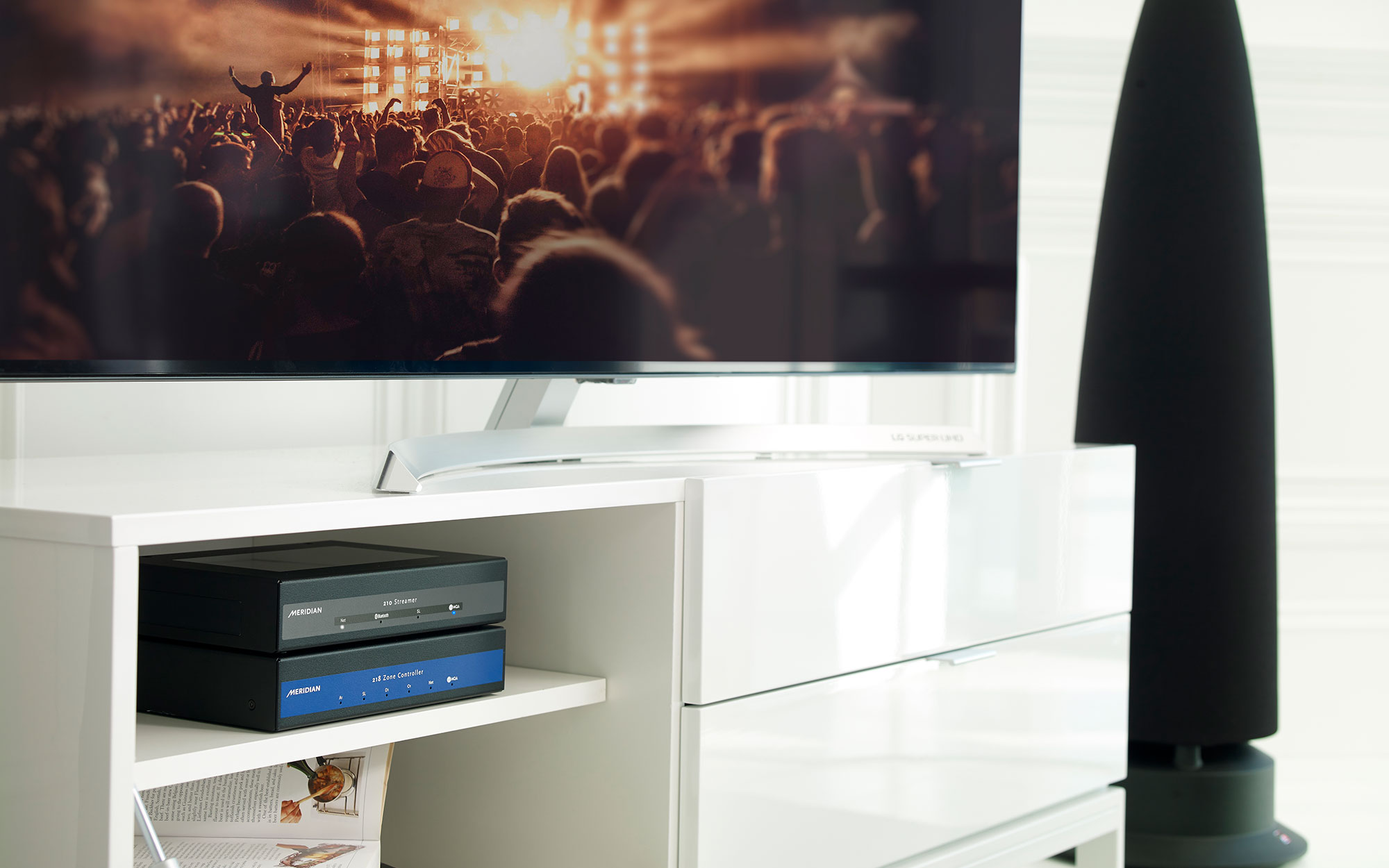


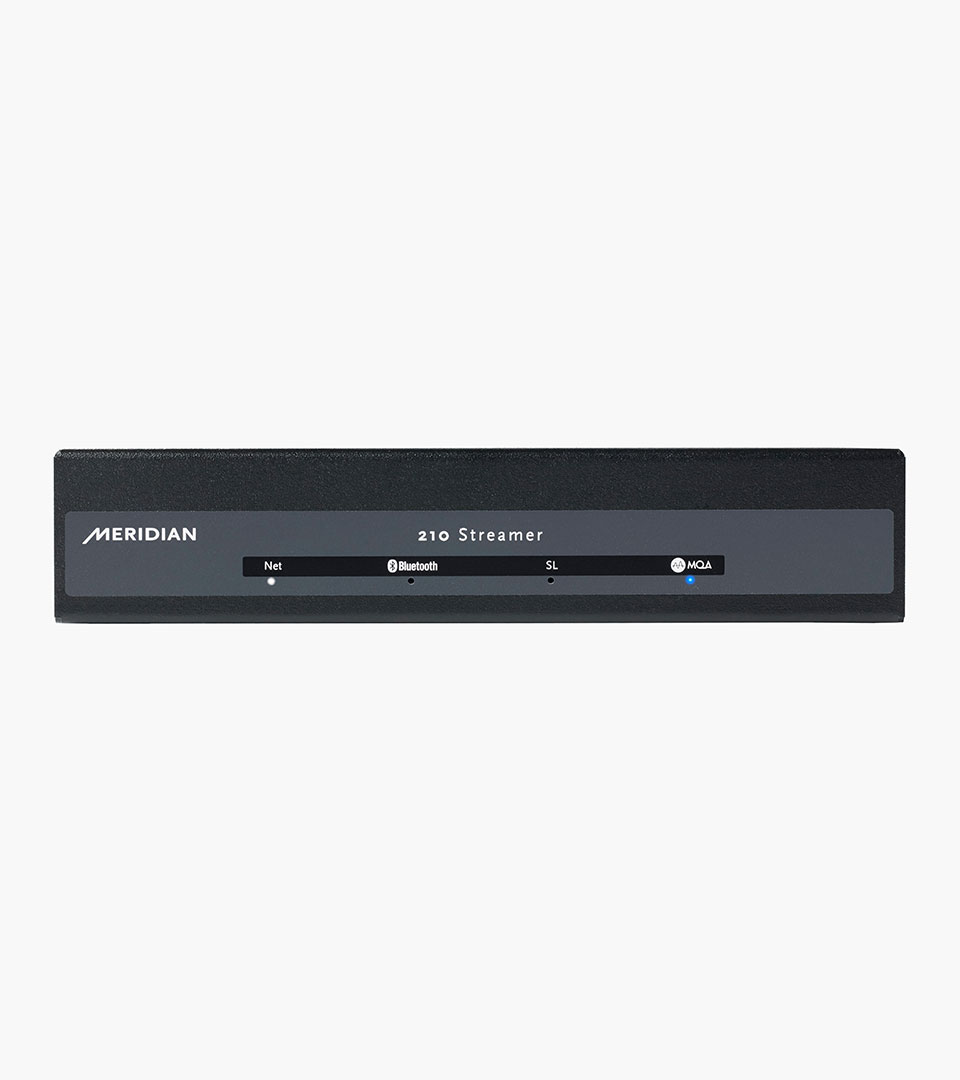
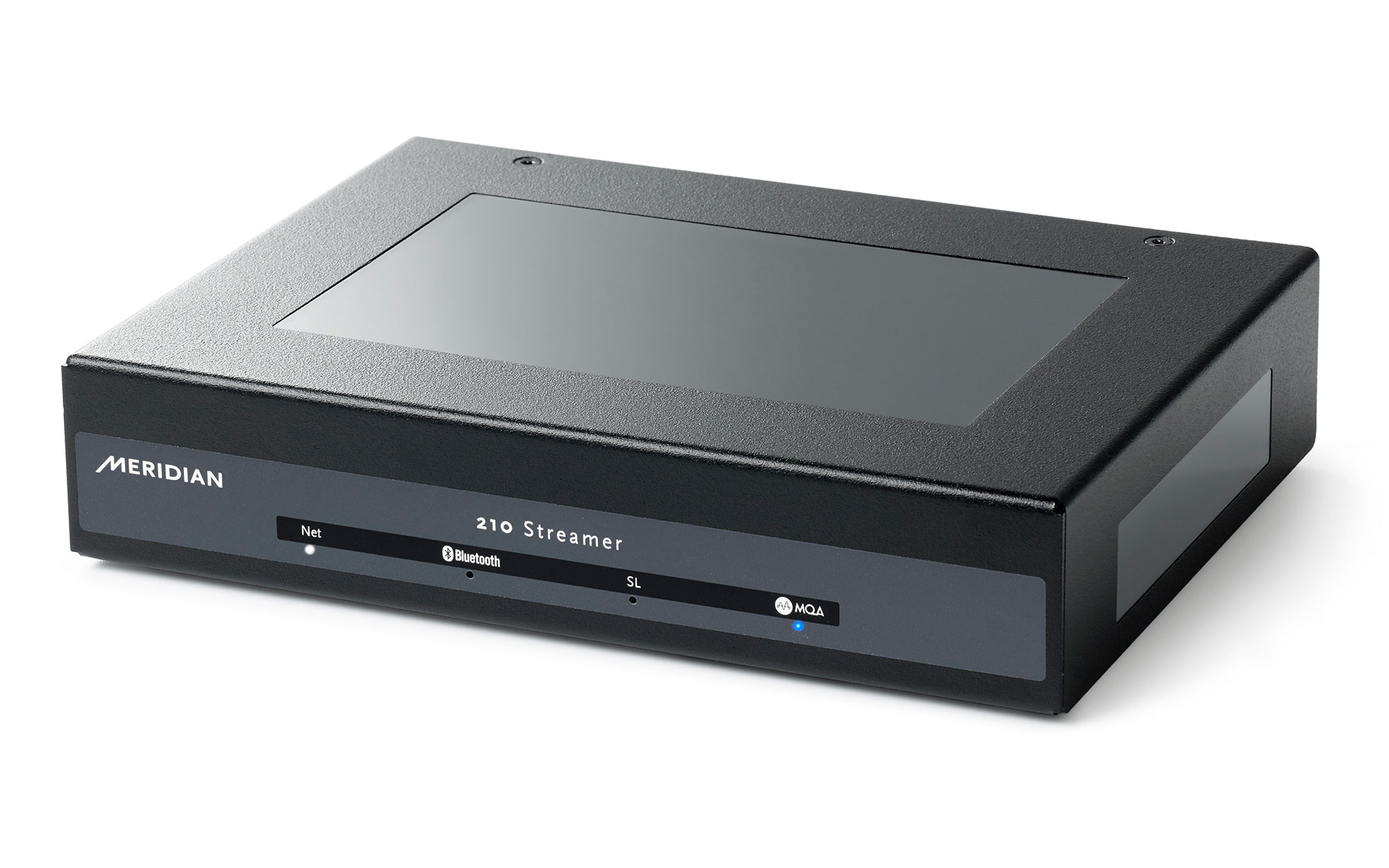
The 210 is a digital audio source product which allows streaming services used on smartphones, tablets and other devices to be played on your audio system. It also supports UPnP for playback of content on USB storage.
Yes. It can supply conventional SPDIF digital audio from its digital aux output. This can be fed into a standard digital audio input on non-Meridian products.
Although the 210 is described as a source product, the audio it outputs can originate from more than one place. This means it can act as a form of pre-amp in certain system configurations. If connected to a pair of Meridian DSP loudspeakers, the 210 can be used to select between differing sources of streaming - Bluetooth, UPnP and the network connection – and it will pass volume control commands from streaming apps to the Meridian loudspeakers. It does not, however, support switching between differing physical sources.
No, the 210 does not support Sooloos streaming.
Yes, the 210 is a 'Roon Ready' device.
There is no practicable limit as long as the network is capable of dealing with the traffic derived from multiple devices.
The unit features an internal switch-mode power-supply and is powered via a “clover-leaf” mains lead (supplied with the product).
Yes. You can connect the 210 to your network via Wi-Fi. This is set up using the Meridian Control App on an iOS or Android device. The app can be downloaded from the Apple App store or Google Play store.
The 210 supports some advanced features which are accessed using the Meridian Control App. This app is available for iOS devices from the Apple Store and from Google Play Store for Android. The app provides access to advanced settings which may be required when integrating the 210 in some system combinations.
The 210 has the ability to output digital audio using Meridian's True Link technology (previously known as MHR), a method for transferring digital audio which is proprietary to Meridian products. True Link offers improved sound quality compared to conventional SPDIF digital audio within a Meridian system. However, when a non-Meridian DAC is fed with a True Link, it results in the constant hissing sound as described in the question. All relevant Meridian products have the option is disable True Link (MHR) within their settings. Once True Link is disabled, conventional SPDIF will be output from the device.
Firmware updates for the 210 are released over the Internet and are applied to product using the Meridian Control App. The app notifies the user of any available updates and includes a 'check for updates' feature. Naturally, this requires the 210 to be connected to the Internet.
No. It can only decode MQA content received via its network connection (wired or wireless).
There is no way for a Bluetooth connection to distinguish between differing types of audio sent out from a phone. The notification of the incoming call is seen by the 210 as a valid audio signal and it switches to playing the sound from the phone. This can be avoided by disconnecting the phone’s Bluetooth connection when audio is being played from elsewhere. Or, if you want to keep the phone connected, there are specific settings on the 210 for the Start-up volume and maximum volume of Bluetooth audio which can be used to avoid overly-loud sounds if the phone receives a call. These settings are available from the Meridian Control app (see the 210 User Guide).
The 210 itself does not support Apple Airplay, but it possible to do this using one of the Apple devices which can receive Airplay and has Bluetooth connectivity. If such a device is connected to the 210 via a Bluetooth connection, simply Airplay to the Apple device and it will pass audio over the Bluetooth connection to the 210. One example of this type to set-up is to use an Apple TV playing video to a screen via its HDMI output while audio is played via a Bluetooth connection to the Meridian system.
Full compatibility for these models was introduced with the release of v3.16 in August 2019.
The 210 does not support upsampling, so the sampling rate of the output is dependent on the source of the audio being played. Spotify Connect and Bluetooth wireless technology are limited to a maximum of 48kHz, so their playback will not result in an output at above 48kHz. Roon supports up to 96kHz (as long as it is not configured to limit its output to 48kHz). However, like the 210, Roon does not support upsampling so, for example, a 48kHz stream will be output at 48kHz. UPnP can support up to 192kHz (as long as the playback method is suitably capable). However, as the 210 supports up to only 96kHz, the higher rates of 176.4kHz and 192kHz will result in an output of the 210 at 88.2kHz and 96kHz respectively.
This is the original sampling rate of an unauthenticated MQA stream. 'OFs' is derived from 'Original Frequency (of) Sampling'. It is displayed when the loudspeakers are playing MQA material which does not identify as authenticated. This can occur because the original file is not authenticated or it could be that something in the playback system is preventing authentication. One thing to check is that the 210 has 'MHR' enabled on its output. If this is not set, MQA authentication will not take place. MHR is enabled via the configuration settings on the Meridian Control app. When authenticated MQA material is played, the loudspeaker will display 'MQA' along with the original sampling rate.
The following ports are used: 3813, 443, 80, 8080, 3689, 554, 5297, 5298, 5353 UDP multicast.
The maximum power available from the USB socket is approximately 12 Watts. Some devices require more power than this when charging. If the device being charged requires more power than the 210 can deliver, the 210 will stop working properly and the symptoms described may result.